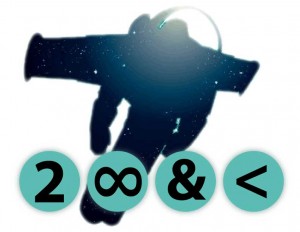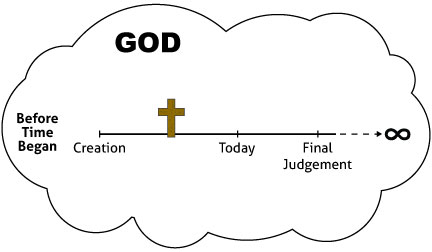 Sometimes in my haste to explain things I can occasionally omit some very helpful information. For example, as I have been discussing some of God’s incommunicable attributes I have neglected to talk about an important concept – infinity.
Sometimes in my haste to explain things I can occasionally omit some very helpful information. For example, as I have been discussing some of God’s incommunicable attributes I have neglected to talk about an important concept – infinity.
What does “infinity” mean? The answer you receive to that question really depends upon whom you chose to ask. Philosophers, scientists and theologians will all have slightly different and conflicting understandings of what infinity is. Although it might be difficult to define satisfactorily, we can know some things about it clearly and definitely.
Here is what we understand about infinity. It is not big, nor huge, nor extremely humongously enormous. It is ENDLESS and it is BOUNDLESS. It does not grow, increase or get larger. It is FULLY FORMED. It is also something completely foreign to our created existence. Apart from God, nothing is infinite. This is why it is difficult for us to wrap our minds around the concept of infinity.
So why take the time to establish an understanding about infinity? This is because we serve an infinite God (endless, boundless and fully formed). Since God is infinite relative to space he is said to be omnipresent (discussed here). Because he possesses both infinite knowledge and power he is said to be omniscient (discussed here) and omnipotent (discussed here). Seeing as he is infinite with respect to time he is said to be eternal (discussed here). Whatever God is (love, faithful, righteous, wise, etc), he is without limit and fully formed. This leads to two very important things we need to know about the infinity of God.
First off we need to know infinite does not mean all. This is a very important distinction, because it isn’t difficult to make the leap from saying, “God is infinite” to saying, “God is everything.” The first statement is correct; the second statement is incorrect. Not only is it wrong, but it is a known heresy called pantheism. The Bible makes a clear distinction between The Creator and his creation. To hold the position that God is everything destroys that distinction. So how can we understand God’s infinite nature and yet keep the Creature/Creator separation? Let me try and give you an analogy that might make things a bit clearer.
Imagine a sponge submerged deep into the center of the ocean. From the sponge’s perspective its whole world would consist of water. Not only would water completely surround the sponge, but it would completely saturate the sponge as well. There would not be any measurable space in or around the sponge devoid of water. We understand the sponge is not water, it is still distinctly a sponge, but water would be found in, around, and throughout the entire sponge.
Now think of all of creation as being that one little sponge, and God as a boundless ocean. There is not one single speck of space in the entire universe that is void of his presence and influence. Although God completely surrounds and saturates all of his creation, he is separate and distinct from his creation. Infinity does not mean all.
The second thing we need to know is that although God is infinite he is also personal. The finite (us) can not perceive or know the infinite (God) unless the infinite first interacts with, and makes itself know to, the finite. We know of God and his infinite nature simply because he has made himself known to us. He has revealed himself through his creation (Rom 1:19) and through his Word (Heb 1:1). In no greater way did the infinite make himself known than when he chose to take on the form of his creation and dwell among us (Heb 1:2). Now that is really cool.


